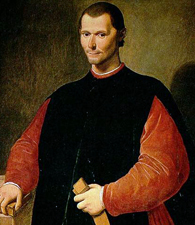Niccolò Machiavelli lived through one of the most tumultuous periods in Italian history. An early alliance with the wrong faction suspended his political career; however, it did give him time to write several books, including his most famous work, “The Prince,” about how to gain and retain political power.
Niccolò Machiavelli’s Early Days
Niccolò Machiavelli was born on May 3, 1469, in Florence. Little is known about his early life, except that at a young age he became a student of the well-known Latin teacher Paolo da Ronciglione and may have attended the University of Florence.
Machiavelli’s political career is better documented. As a young man he was appointed Second Chancellor of the Republic of Florence. He served the republican government for nearly 15 years before his career was derailed. In 1512, the Spanish invaded Florence and reinstated the Medici family, who had previously been overthrown by the republicans.
Sources in this Story
- Stanford Encyclopedia of Philosophy: Niccolò Machiavelli
- Brandeis University: Andreas Teuber: Niccolo Machiavelli Biography
- Lucidcafé: Library: Niccolo Machiavelli
- Forbes: Why Machiavelli Matters
Machiavelli’s Notable Accomplishments
Machiavelli was tortured and imprisoned by the Medici family because of his affiliation with the republican government. Eventually, the Medicis banished Machiavelli to the country, where he wrote books and plays that he hoped would persuade the Medicis to reinstate him in the government.
Machiavelli’s efforts ultimately produced “The Prince” (which he dedicated to a prominent member of the Medici family, to no avail), “Discourse on Livy” and “The Art of War,” among others.
“The Prince,” a revolutionary examination of politics and power inspired by the career of nobleman and military captain Cesare Borgia, is Machiavelli’s best known work. Traditionally, political philosophers saw moral goodness as a prerequisite for political authority, but Machiavelli countered that legitimate and illegitimate power cannot be determined on the basis of perceived morality.
Instead, he explained, any person who can gain and maintain power is fit to rule. Machiavelli argued that the “judicious use of violence”, respect for subjects’ private property and the promotion of material success would ensure enduring and effective leadership.
While his plays earned him recognition and success, “The Art of War” was the only book published during Machiavelli’s lifetime.
Machiavelli gained some slight favor in 1520, when he was appointed official historian of Florence. He began writing “The History of Florence,” but it, too, was only published posthumously. In 1525, Pope Clement VII gave Machiavelli a stipend for his work.
Machiavelli’s luck seemed likely to change again two years later, when the Medicis were overthrown by a republican government. But he was stymied again because ironically, the new government mistrusted Machiavelli for his ties to the Medicis. Not long afterward, Machiavelli became ill and died on June 21, 1527, disappointed in his dreams and dismayed by the country’s internal strife.
The Man and His Work
- “The Essential Writings of Machiavelli”
- “The Prince”
- “The Art of War”
- “Machiavelli: Philosopher of Power,” by Ross King
- “Niccolò’s Smile: A Biography of Machiavelli,” by Maurizio Viroli
The Rest of The Story
Machiavelli’s pragmatic view has earned him many critics and has frequently caused readers to misinterpret his writings. Today, the term “Machiavellian” is often used to describe the selfish, unscrupulous pursuit of power.
Nevertheless, Machiavelli’s teachings remain widely influential. In 2008, Ian Demack wrote a Forbes magazine article that examined how the political philosopher’s teachings can be applied to modern circumstances.
Demack argues that even today’s power dynamics can be understood by reading “The Prince.” In keeping with Machiavelli’s advice, Demack suggests that the reader “[o]bserve others with unfailing honesty. Look within yourself. Identify and acknowledge your weaknesses. Cultivate your inner strengths.” These, Demack believes, are the core principles of Machiavelli’s work and will benefit anyone, regardless of his or her political or financial status.
This article was originally written by Isabel Cowles; it was updated March 31, 2017.











